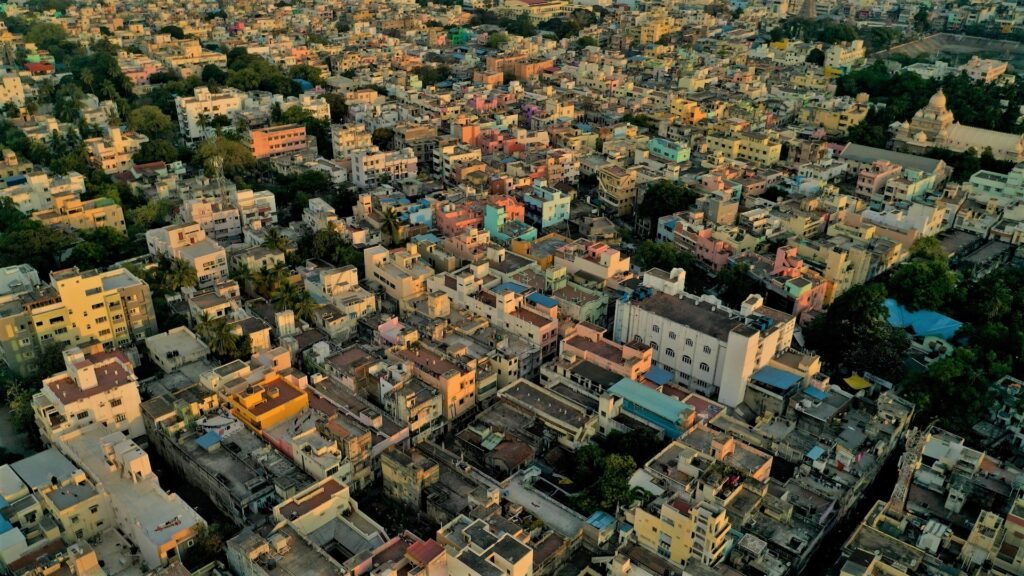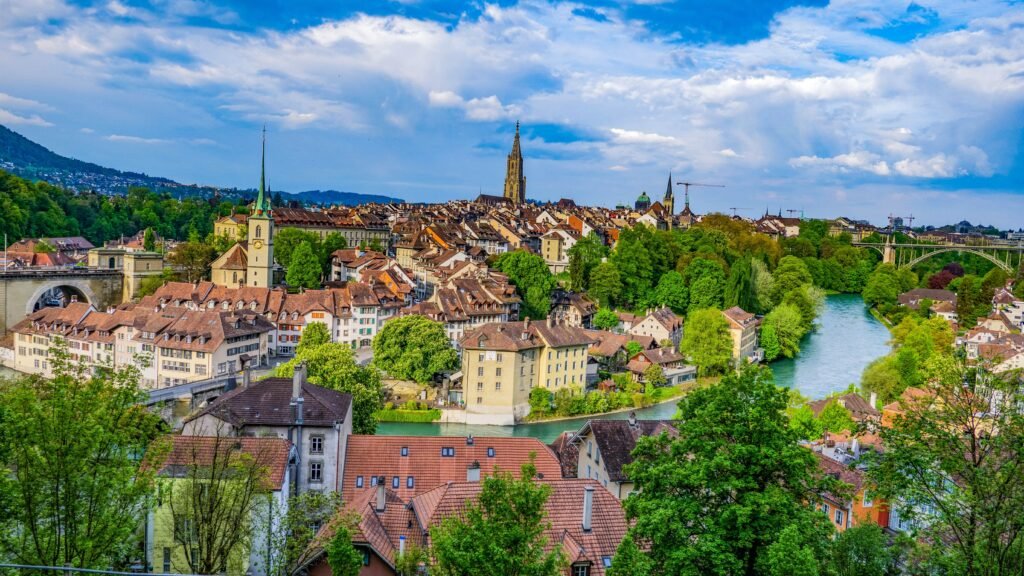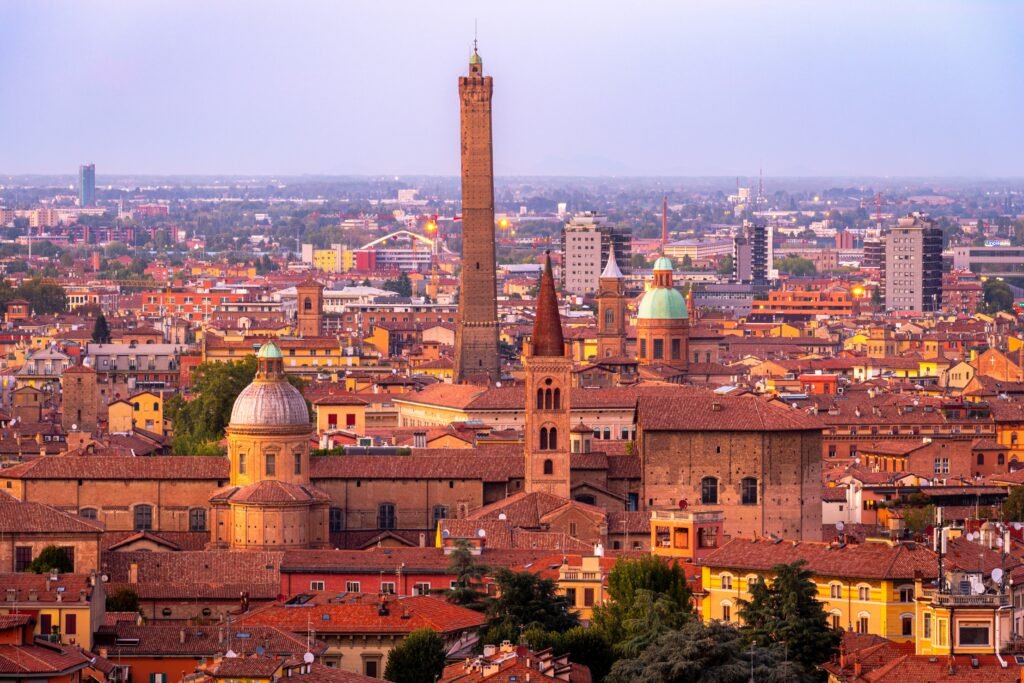Chennai, formerly known as Madras, is the capital city of the Indian state of Tamil Nadu. Situated on the southeastern coast of India, Chennai is a vibrant metropolis that beautifully blends its rich cultural heritage with modernity. With a history spanning over four centuries, Chennai boasts a diverse tapestry of temples, museums, beaches, and contemporary developments. In this blog, we’ll explore the various facets of Chennai, covering its history, culture, landmarks, cuisine, festivals, and much more. Planning a trip to Chennai ? For travel insurance, see here, and for flights, here.
Table of Contents
Historical Background
Chennai, formerly known as Madras, has a fascinating historical background that spans over four centuries. Let’s delve deeper into its history:
1. Early History: Chennai’s history dates back to ancient times, with evidence of human settlements in the region dating as far back as the Stone Age. The area was part of the Tondaimandalam region, ruled by the Cholas during the 1st century AD. Later, it came under the rule of the Pallavas, who were known for their patronage of art, architecture, and literature.
2. Founding of Madras: The foundation of modern-day Chennai can be traced to August 22, 1639. On this day, a piece of land known as “Chennirayarpattinam” was acquired by the British East India Company from the Vijayanagara Empire. This strategic piece of land was chosen for its coastal location, making it an ideal trading post and harbor for the British.
3. Establishment as a British Settlement: Francis Day and Andrew Cogan, agents of the British East India Company, played a crucial role in establishing the settlement. They secured the land from the local Nayak rulers and laid the groundwork for the construction of Fort St. George, which would later become the nucleus of the British settlement.

4. Development under the British Rule: Madras grew steadily under British rule and quickly became an important administrative and military center. The Fort St. George served as the headquarters of the British East India Company in South India. The city saw significant infrastructure development, including the construction of roads, bridges, and educational institutions.
5. Emergence as the Capital of Madras Presidency: In 1653, Madras was officially declared the capital of the Madras Presidency, which was one of the three major British administrative divisions in India. The Madras Presidency covered a vast territory, including present-day Tamil Nadu, parts of Andhra Pradesh, Karnataka, and Kerala.
6. Contribution to Indian Independence Movement: Chennai played a crucial role in India’s struggle for independence. Many prominent leaders emerged from the region, and the city witnessed several important events during the freedom movement. The Swadeshi Movement and Non-Cooperation Movement found support among the people of Chennai.
7. Post-Independence Era: After India gained independence in 1947, Madras remained the capital of Madras State. In 1969, the state was renamed Tamil Nadu, and in 1996, Madras was officially renamed Chennai, derived from the name of a nearby village “Chennapatnam,” mentioned in ancient records.
8. Urban Expansion and Growth: In the post-independence era, Chennai experienced rapid urbanization and industrial growth. The city’s economy diversified, with the establishment of manufacturing industries, automobile plants, and the growth of the IT sector, transforming it into a major economic hub in South India.
9. Cultural Heritage and Preservation: Chennai takes pride in preserving its rich cultural heritage. The city has managed to retain its traditional arts, music, dance, and cuisine, while also embracing modernity. Various heritage structures have been conserved and protected to showcase the architectural brilliance of bygone eras.
10. Resilience and Progress: Chennai has witnessed several challenges over the years, including natural disasters like cyclones and floods. Despite these adversities, the spirit of the city’s people remains strong, and Chennai continues to progress as a modern and dynamic metropolis, contributing significantly to India’s growth story.
Overall, Chennai’s historical background is a tapestry woven with the threads of ancient civilizations, colonial influences, and post-independence developments. The city stands as a testament to the fusion of tradition and progress, making it a unique and vibrant destination in India.
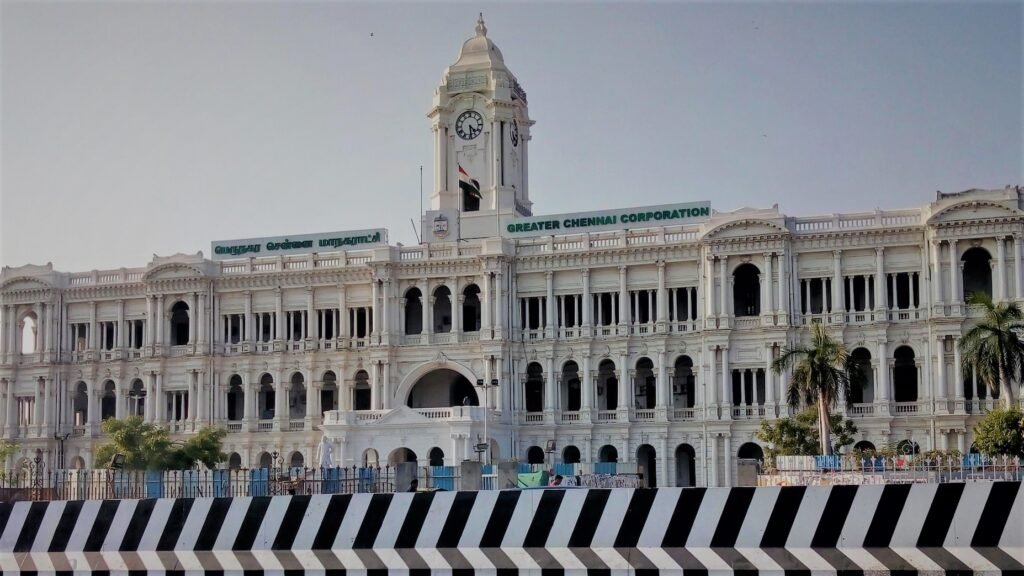
Architectural Marvels
Chennai is a city adorned with a rich architectural heritage that reflects its diverse history and cultural influences. From ancient temples to colonial-era structures and modern marvels, here are some of the architectural gems that make Chennai a fascinating destination for architecture enthusiasts:
1. Kapaleeshwarar Temple: One of the most iconic landmarks in Chennai, the Kapaleeshwarar Temple is a magnificent example of Dravidian architecture. Dedicated to Lord Shiva, the temple’s construction dates back to the 7th century during the Pallava dynasty and was later expanded by the Cholas and Vijayanagara rulers. Its towering gopurams (entrance towers), intricately carved pillars, and vibrant sculptures make it a visual delight.
2. Fort St. George: Built-in 1644 by the British East India Company, Fort St. George is one of the earliest surviving British constructions in India. The fort houses the St. Mary’s Church, the oldest Anglican church in India, and the Fort Museum, which exhibits artifacts from the colonial period. The architecture of the fort reflects a blend of British and Indian influences.
3. Santhome Cathedral Basilica: This Roman Catholic basilica is a prominent religious landmark in Chennai. It is believed to house the remains of St. Thomas the Apostle, and the church’s Neo-Gothic architectural style with towering spires and stained glass windows is a sight to behold.

4. Parthasarathy Temple: Another significant temple in Chennai, the Parthasarathy Temple, is a fine example of traditional Dravidian architecture. Built during the 8th century, it is dedicated to Lord Krishna and showcases exquisitely carved sculptures and ornate pillars.
5. Madras High Court: The Madras High Court building, designed by British architect Henry Irwin, is an imposing neo-classical structure constructed in the late 19th century. With its impressive domes, Corinthian columns, and grand façade, the High Court building is an architectural masterpiece.
6. Chennai Central Railway Station: The Chennai Central Railway Station, designed by British architect George Harding, is an elegant example of British colonial architecture. Its imposing Gothic-style façade, tall arches, and intricate carvings make it an architectural landmark and a bustling transportation hub.
7. Government Museum Complex: The Government Museum in Chennai is one of the oldest and most significant museums in India. The complex houses several buildings, each showcasing a different architectural style, including Indo-Saracenic, Romanesque, and Italianate. The museum displays an extensive collection of art, archaeology, and cultural artifacts.

8. Thousand Lights Mosque: The Thousand Lights Mosque is an iconic mosque in Chennai, known for its striking façade and unique architecture. Its name is derived from the numerous oil lamps that used to illuminate the mosque in the past. The mosque’s design incorporates both Islamic and Indo-Saracenic architectural elements.
9. Valluvar Kottam: Valluvar Kottam is a modern architectural marvel dedicated to the renowned Tamil poet and philosopher Thiruvalluvar. The monument is shaped like a chariot and houses a life-size statue of Thiruvalluvar. The auditorium inside can accommodate thousands of people and is a popular venue for cultural events.
10. Chettinad Mansions: While not within Chennai city itself, the nearby Chettinad region is famous for its opulent Chettinad mansions. These palatial houses, built by wealthy merchants during the 19th and early 20th centuries, showcase a blend of South Indian, European, and Asian architectural styles, featuring spacious courtyards, intricate woodwork, and ornate interiors.
Chennai’s architectural marvels stand as a testament to the city’s rich history and the confluence of diverse cultures that have influenced its development over the centuries. Exploring these structures provides a glimpse into the past and the enduring legacy of Chennai’s architectural heritage.
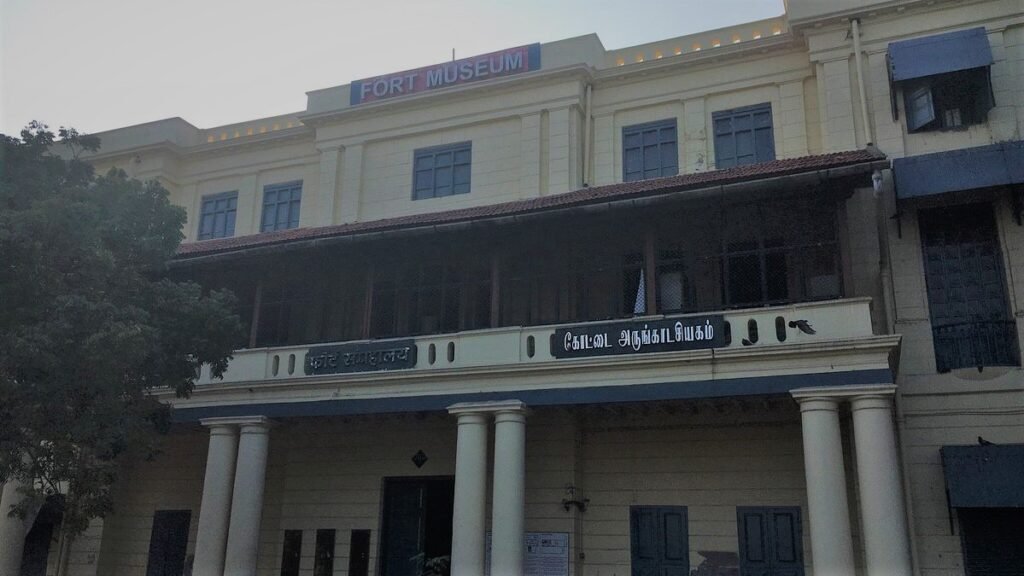
Culture and Arts
Chennai’s culture and arts have a deep-rooted history, making it a significant cultural hub in India. The city’s cultural scene is diverse, vibrant, and deeply connected to its traditional roots. Here are some key aspects of Chennai’s culture and arts:
1. Carnatic Music: Chennai is renowned as the birthplace and heartland of Carnatic music, one of the oldest classical music traditions in the world. The city has been a nurturing ground for many legendary musicians and composers. The famous December Music Season, also known as the Margazhi season, is a month-long festival of classical music and dance, drawing artists and enthusiasts from all over the world.
2. Bharatanatyam Dance: Bharatanatyam, a classical dance form that originated in Tamil Nadu, is an integral part of Chennai’s cultural heritage. Many prestigious dance academies and institutions in the city preserve and promote this traditional art form. The dance performances during the Margazhi season add a special charm to Chennai’s cultural calendar.
3. Art and Craft: Chennai has a rich tradition of art and craft, with a particular focus on traditional forms such as Tanjore paintings, Kolu dolls (Golu dolls), and the art of kolam (intricate floor drawings). These art forms are an integral part of celebrations during festivals and important occasions.
4. Literature and Tamil Language: Chennai has a strong literary heritage, with Tamil being one of the oldest languages in the world. The city has produced renowned poets, authors, and scholars throughout history. The Tamil Sangam literature, which dates back to ancient times, is an important part of Tamil literary history.
5. Drama and Theater: Chennai has a thriving theater culture with a history dating back to the 19th century. The city’s theater scene includes both traditional and contemporary performances in Tamil and other languages. The famous Rukmini Arangam and Narada Gana Sabha are prominent venues for theatrical productions.
6. Chennai Film Industry (Kollywood): Chennai is a significant hub for the Tamil film industry, popularly known as Kollywood. Tamil cinema has a dedicated following, and Chennai has been home to several iconic film studios and production houses. The city’s residents have a deep affection for their favorite film stars and celebrate the release of new films with great enthusiasm.
7. Temples and Religious Festivals: Chennai’s culture is closely intertwined with its religious traditions. The city is dotted with numerous temples, each showcasing unique architectural styles and hosting various festivals throughout the year. Festivals like Pongal, Navaratri, and Deepavali are celebrated with fervor, bringing communities together in joyous celebrations.

8. Festivals of Dance and Music: Apart from the December Music Season, Chennai hosts various other cultural festivals celebrating dance and music. The Natyanjali Dance Festival held at the Chidambaram Nataraja Temple and the Chennai Dance and Music Festival are notable events that attract artists and audiences from across the country.
9. Culinary Culture: Chennai’s culinary culture is diverse and reflects the city’s multicultural history. From traditional South Indian delicacies like dosa, idli, and filter coffee to Chettinad cuisine’s spicy delights, the city’s food scene is a delightful exploration of flavors.
10. Modern Cultural Spaces: Chennai embraces modernity while preserving its cultural traditions. The city has numerous cultural centers, art galleries, and performing arts venues that host contemporary and experimental performances, promoting emerging artists and art forms.
Chennai’s culture and arts continue to thrive, evolving with the times while cherishing its age-old traditions. It is a city where classical art forms find harmony with modern expressions, creating a unique cultural tapestry that captivates both residents and visitors alike.
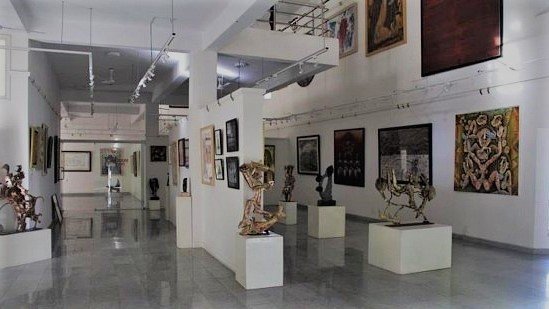
Education and Knowledge Hub
Chennai has earned the reputation of being an educational and knowledge hub in India due to its strong academic institutions, research centers, and a culture that emphasizes the pursuit of knowledge. The city has a long history of providing quality education and has been a magnet for students and scholars from all over India and beyond. Here’s more about Chennai as an education and knowledge hub:
1. Prestigious Universities: Chennai is home to several prestigious universities that offer a wide range of academic programs. The University of Madras, established in 1857, is one of the oldest and most renowned universities in India. Other prominent universities include Anna University, Indian Institute of Technology Madras (IIT-M), and Tamil Nadu Agricultural University (TNAU).
2. IIT Madras: Indian Institute of Technology Madras, commonly known as IIT-M, is one of the premier engineering institutions in India. It is known for its academic excellence, cutting-edge research, and innovative projects. IIT Madras has consistently ranked among the top engineering institutes in the country.
3. Research and Development: Chennai’s academic institutions are at the forefront of research and development across various disciplines. The city houses research centers and laboratories focusing on fields such as science, engineering, biotechnology, medicine, and social sciences.

4. Medical Education: Chennai is renowned for its medical education and healthcare facilities. The city is home to several prestigious medical colleges and research institutes, including the Madras Medical College, Christian Medical College (CMC), and the National Institute of Siddha.
5. Information Technology (IT) Education: Chennai has played a significant role in India’s IT revolution, and it offers excellent IT education and training. Institutes like the International Institute of Information Technology (IIIT), Chennai, and various private coaching centers have contributed to producing skilled IT professionals.
6. Arts and Humanities: Chennai’s education hub is not limited to science and technology; it also excels in arts, humanities, and social sciences. The city has a thriving cultural and literary scene, with institutions focusing on subjects like literature, history, economics, and performing arts.
7. Language and Literature: Chennai’s rich literary heritage extends to its focus on language education. The city is a prominent center for learning Tamil, one of the oldest languages in the world. Several institutions offer courses in Tamil literature, language, and linguistics.
8. Educational Infrastructure: Chennai boasts excellent educational infrastructure, including modern campuses, state-of-the-art libraries, and well-equipped laboratories. The city’s commitment to education is evident in the extensive network of schools, colleges, and specialized institutes.
9. Student Community: Chennai’s education hub attracts students from all over India and from abroad. The city’s vibrant student community contributes to its cultural diversity and intellectual vibrancy.
10. Career Opportunities: Chennai’s status as an education hub is also linked to the numerous career opportunities it offers. The city’s thriving industries, particularly IT, manufacturing, and healthcare, provide ample job prospects for graduates and professionals.
Chennai’s identity as an education and knowledge hub is a result of its dedication to providing quality education, fostering research and innovation, and promoting a culture of continuous learning. With its strong academic institutions and a welcoming atmosphere for students, Chennai continues to shape the future of India’s educational landscape.
Chennai: Marina Beach
Marina Beach is one of the most famous and beloved landmarks of Chennai. Stretching over 13 kilometers along the Bay of Bengal, it is the longest urban beach in India and the second longest in the world. Marina Beach holds a special place in the hearts of Chennai’s residents and visitors alike. Here are some key aspects of Marina Beach:
1. History and Importance: Marina Beach has a long history and has been an integral part of Chennai’s cultural and recreational life for centuries. The beach was once the site of several British and Indian fortifications during the colonial era. Today, it serves as a popular spot for locals and tourists to unwind, relax, and enjoy the beauty of the sea.
2. Serene Ambience: Marina Beach offers a serene and calming ambience, making it an ideal place for people to take leisurely strolls or sit and enjoy the breathtaking views of the sea. The gentle sound of the waves and the cool sea breeze make it a perfect escape from the hustle and bustle of the city.
3. Sunrise and Sunset Views: The beach is famous for its stunning sunrise and sunset views. Early morning and evening are the best times to witness the sky painted in hues of orange and pink as the sun rises and sets over the horizon. These moments make for great photo opportunities and cherished memories.

4. Activities and Attractions: Marina Beach offers a range of activities and attractions for visitors. Horse rides and camel rides are available for those seeking a fun experience. The beach also has numerous food stalls offering local delicacies, making it a great place to savor traditional street food.
5. Memorials and Statues: The beachfront is adorned with several memorials and statues of historical and political figures. One of the most prominent is the Anna Memorial, dedicated to Dr. C.N. Annadurai, a former Chief Minister of Tamil Nadu. The Victory War Memorial, commemorating soldiers who lost their lives in World War I, is another notable landmark on the beach.
6. Festivals and Events: Marina Beach becomes a hub of activity during various festivals and events. During Pongal, the harvest festival of Tamil Nadu, the beach comes alive with festivities and cultural celebrations. The beach is also a popular spot for Independence Day and Republic Day celebrations.

7. Fishing Community: The northern end of Marina Beach is a bustling fishing harbor where local fishermen bring in their catch of the day. Visitors can witness the traditional fishing activities and see the vibrant fish market in action.
8. Safety and Caution: While Marina Beach is a popular destination, visitors are advised to exercise caution while swimming in the sea. The beach is known for strong undercurrents, and swimming can be hazardous. It’s essential to follow the safety guidelines and warnings issued by authorities.
Marina Beach holds a significant place in Chennai’s identity and continues to be a cherished destination for people of all ages. Whether it’s a leisurely evening stroll, a family picnic, or simply enjoying the natural beauty of the sea, Marina Beach offers a delightful experience that captures the essence of Chennai’s coastal charm.

Delectable Cuisine
Chennai’s delectable cuisine is a delightful blend of traditional South Indian flavors, aromatic spices, and unique regional dishes. From street food to fine dining, the city offers a diverse range of dishes that cater to every palate. Here are some of the highlights of Chennai’s mouthwatering cuisine:
1. South Indian Breakfast Delights: Chennai is famous for its wholesome and hearty breakfast options. Idli (steamed rice cakes), dosa (thin fermented rice and lentil crepes), and vada (deep-fried lentil fritters) are some of the popular breakfast items. They are typically served with an array of chutneys and sambar (a lentil-based vegetable stew).
2. Filter Coffee: Chennai is synonymous with filter coffee, also known as “Madras Coffee.” This aromatic and frothy coffee is made by filtering coffee decoction through a metal filter and serving it with hot milk and sugar. It’s a must-try for coffee enthusiasts.
3. Chettinad Cuisine: Chettinad cuisine hails from the Chettinad region near Chennai and is known for its bold flavors and liberal use of spices. Some of the must-try Chettinad dishes include Chettinad chicken curry, spicy fish fry, and the fiery Chettinad pepper chicken.
4. Seafood Delicacies: Being a coastal city, Chennai offers a delectable array of seafood dishes. From prawn curry and fish fry to crab masala and squid roast, seafood lovers are in for a treat.
5. Biryani and Rice Varieties: Chennai’s biryani is a delightful blend of fragrant basmati rice, succulent meat (usually chicken or mutton), and a harmonious mix of spices. Other popular rice-based dishes include lemon rice, tamarind rice, and curd rice.
6. Street Food: Chennai’s streets are teeming with a variety of delectable street food options. Some popular street snacks include pani puri (golgappa), masala vadai, bhel puri, and kothu parotta (shredded flatbread cooked with vegetables and spices).
7. Sweets and Desserts: Chennai’s sweets are a delight for those with a sweet tooth. Traditional sweets like mysore pak, badusha, and jangri are some of the favorites. Don’t miss the traditional South Indian dessert, payasam (kheer), often served during festivals and special occasions.

8. Banana Leaf Meals: One of the unique dining experiences in Chennai is the traditional banana leaf meal. Served on a banana leaf, the meal typically includes a variety of dishes, including rice, sambar, rasam, curries, and desserts. It’s a fulfilling and flavorful experience.
9. Street-side Tea Stalls: Apart from filter coffee, Chennai’s tea stalls are also famous for serving “karak chai” (strong tea) in small glasses. The tea is infused with spices and milk, creating a delightful and rejuvenating beverage.
10. International Cuisine: Chennai’s cosmopolitan nature is evident in its wide range of international cuisine. The city boasts numerous restaurants serving Chinese, North Indian, Continental, and other global cuisines.
Chennai’s delectable cuisine reflects the city’s vibrant culture and culinary heritage. Whether you’re a fan of traditional South Indian fare or eager to explore the flavors of Chettinad and beyond, Chennai’s food scene promises a memorable gastronomic experience.
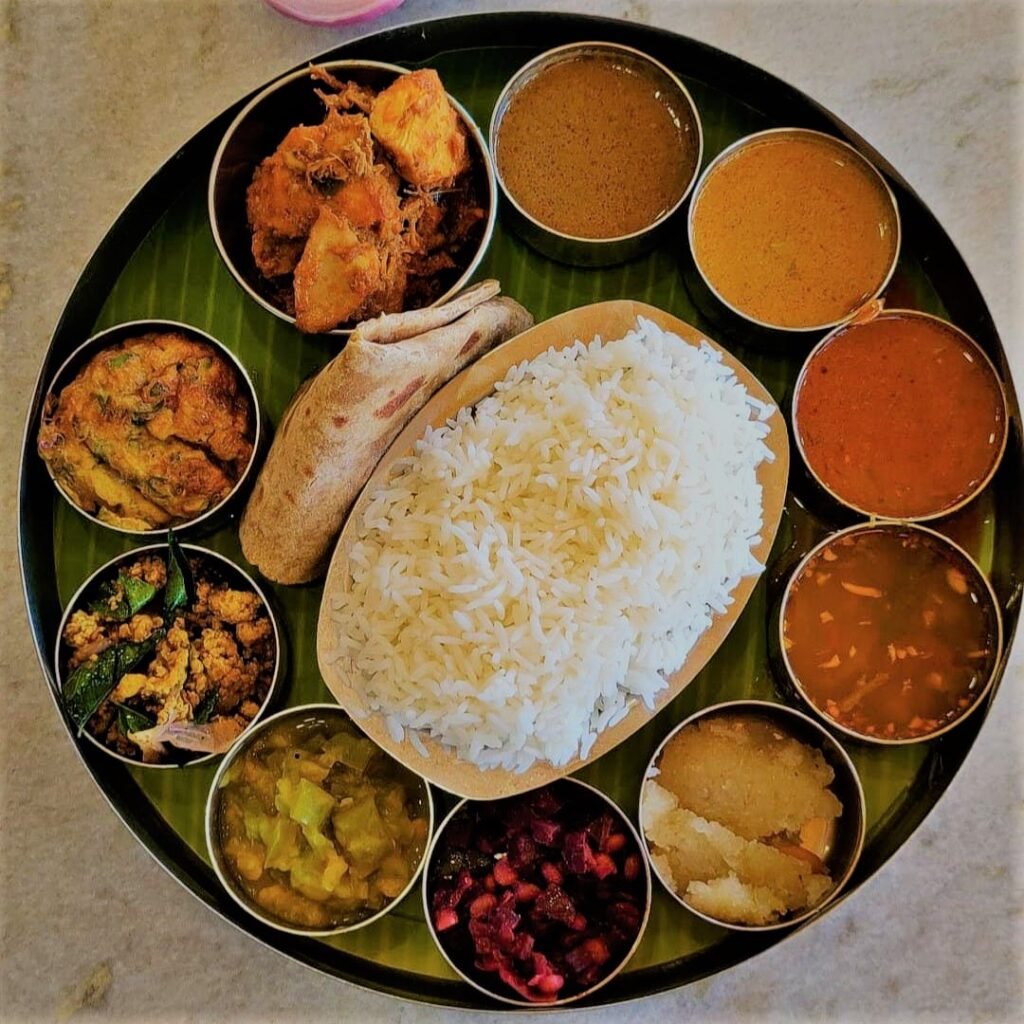
Festivals and Celebrations
Chennai is a city that celebrates its cultural diversity with great enthusiasm and fervor. Throughout the year, the city hosts a plethora of festivals and celebrations that showcase its rich heritage and traditions. These festivities bring people together, creating a sense of unity and joy. Here are some of the major festivals and celebrations celebrated in Chennai:
1. Pongal: Pongal, the harvest festival, is one of the most significant festivals in Chennai and Tamil Nadu. It is typically celebrated in mid-January and lasts for four days. During Pongal, people offer prayers to the Sun God and thank him for a bountiful harvest. The festivities include decorating homes with kolam (rangoli), cooking a traditional sweet dish called Pongal, and performing cultural events and games.
2. Tamil New Year (Puthandu): Celebrated in mid-April, Tamil New Year marks the first day of the Tamil calendar. The day is marked by wearing new clothes, visiting temples, and sharing festive meals with family and friends. Homes are adorned with mango leaves and kolam designs to welcome prosperity and good fortune.
3. Vinayaka Chaturthi: This festival celebrates the birth of Lord Ganesha and is observed with great devotion by Hindus in Chennai. Idols of Lord Ganesha are installed in homes and public places, and colorful processions are taken out, accompanied by drummers and dancers. The festival culminates with the immersion of Ganesha idols in the sea or rivers.
4. Navaratri: Navaratri, meaning “nine nights,” is a vibrant festival celebrating the triumph of good over evil. During these nine nights, the city comes alive with beautifully adorned Golu displays (arrangements of dolls) in homes and public spaces. Traditional dance performances like Bharatanatyam are held during Navaratri, adding to the festive atmosphere.
5. Diwali: Diwali, the Festival of Lights, is celebrated with much enthusiasm in Chennai. Homes and streets are illuminated with diyas (oil lamps) and colorful lights. People exchange sweets, burst fireworks, and participate in cultural events to celebrate the victory of light over darkness.
6. Christmas: Christmas is celebrated with joy and harmony by the Christian community in Chennai. Churches are beautifully decorated, and midnight Mass attracts a large gathering of faithful. The city is adorned with Christmas trees, and carol singing and feasting are common traditions during this festive season.
7. Eid-ul-Fitr: Eid-ul-Fitr, celebrated by the Muslim community, marks the end of Ramadan, the holy month of fasting. Special prayers are offered at mosques, and people exchange greetings and gifts. Delicious feasts, including biryani and sweets, are prepared to celebrate the occasion.

8. Music and Dance Festivals: Chennai’s cultural calendar is incomplete without its renowned music and dance festivals. The December Music Season (Margazhi festival) is a month-long extravaganza of classical music and dance performances, drawing artists and connoisseurs from around the world.
9. Independence Day and Republic Day: National festivals like Independence Day (August 15) and Republic Day (January 26) are celebrated with flag hoisting, parades, and cultural events across the city.
Chennai’s festivals and celebrations reflect the city’s diverse cultural fabric and its spirit of unity in diversity. These occasions bring people together, fostering a sense of belonging and pride in their cultural heritage. Whether it’s a religious festival, a music concert, or a cultural event, Chennai’s festivities are a true celebration of life and the city’s vibrant cultural ethos.
Economic Hub
Chennai has emerged as a major economic hub in South India, playing a crucial role in the region’s economic growth and development. The city’s strategic location on the southeastern coast of India, well-developed infrastructure, and skilled workforce have contributed to its status as an important economic center. Here are some key aspects that make Chennai an economic hub:
1. Information Technology (IT) and Software Services: Chennai is a prominent player in India’s IT industry and is often referred to as the “Detroit of India” for its booming automobile and IT sectors. The city hosts a large number of IT companies and software development centers, providing a wide range of services such as software development, IT consulting, and business process outsourcing (BPO).
2. Automobile Manufacturing: Chennai is a significant manufacturing hub for the automobile industry in India. Several major automobile manufacturers, both domestic and international, have set up production units in and around the city. This has led to the development of a robust automotive ecosystem, attracting ancillary industries and creating numerous job opportunities.
3. Manufacturing and Export: Apart from the automobile sector, Chennai’s manufacturing industry encompasses a wide range of sectors such as electronics, textiles, pharmaceuticals, chemicals, and engineering. The city serves as a major export hub, shipping products to various international destinations.
4. Port and Trade: The Port of Chennai is one of the largest and busiest ports in India. It handles a significant share of the country’s container cargo and is a vital gateway for trade with other countries. The port’s strategic location and efficient operations make it an essential component of Chennai’s economic activities.
5. Financial Services and Banking: Chennai hosts several national and international banks, financial institutions, and insurance companies. The city’s financial services sector plays a crucial role in supporting various industries, providing funding, and facilitating investment opportunities.
6. Healthcare and Medical Tourism: Chennai is renowned for its world-class healthcare facilities and medical expertise. The city attracts a large number of medical tourists from around the world seeking high-quality medical treatment at relatively affordable costs.
7. Education and Research: Chennai’s status as an education and knowledge hub has a significant impact on its economy. The presence of prestigious educational institutions and research centers not only produces a skilled workforce but also contributes to research and innovation in various fields.

8. Real Estate and Infrastructure Development: The rapid economic growth of Chennai has fueled significant real estate and infrastructure development in the city. Commercial and residential properties, along with modern infrastructure projects, have transformed the urban landscape.
9. Tourism and Hospitality: Chennai’s rich cultural heritage and vibrant city life attract a considerable number of domestic and international tourists. The city’s hospitality sector, comprising hotels, restaurants, and tourism services, benefits from this inflow of visitors.
10. Start-up Ecosystem: Chennai has also witnessed a thriving start-up ecosystem in recent years. The city’s supportive environment for entrepreneurship and innovation has led to the emergence of numerous start-ups in various sectors, including technology, e-commerce, and healthcare.
Chennai’s economic hub status stems from its diversified economic sectors, strong industrial base, strategic location, and skilled workforce. The city continues to grow as a vital player in India’s economic landscape, contributing significantly to the nation’s overall development and progress.
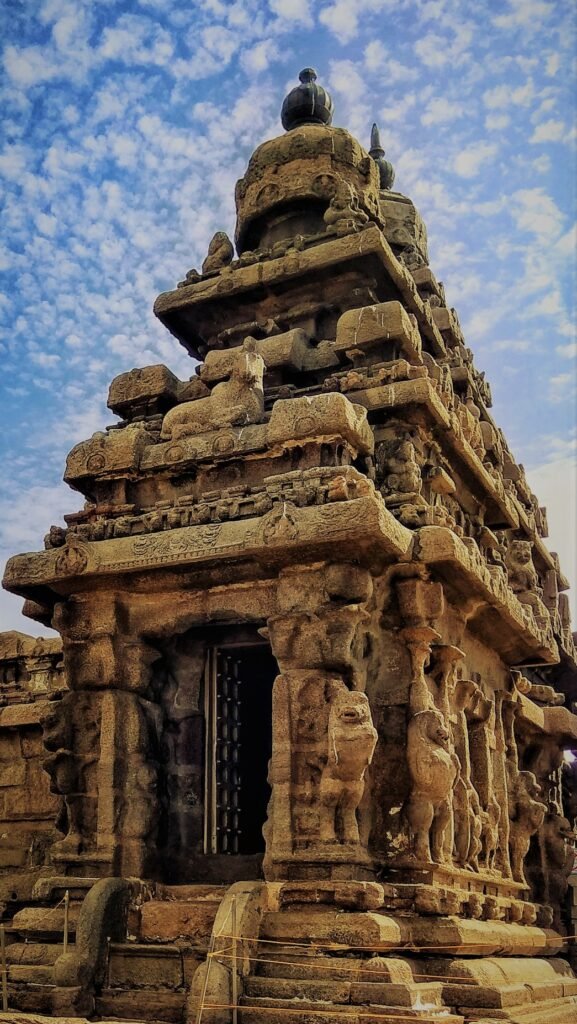
Parks and Recreation
Chennai offers a variety of parks and recreational spaces that provide a green escape from the bustling city life. These parks are not only places for relaxation but also serve as popular spots for leisure activities, exercise, and family outings. Here are some of the notable parks and recreational areas in Chennai:
1. Guindy National Park: Located in the heart of the city, Guindy National Park is one of the smallest national parks in India. Despite its size, it is an important ecological reserve and a green oasis amidst urban development. The park is home to various species of flora and fauna, including spotted deer, blackbucks, and several bird species.
2. Arignar Anna Zoological Park (Vandalur Zoo): Arignar Anna Zoological Park, popularly known as Vandalur Zoo, is the largest zoo in South Asia. It is home to a diverse range of animals, including tigers, lions, elephants, and exotic birds. The zoo also includes a safari park where visitors can view animals in a naturalistic setting.
3. Semmozhi Poonga: Semmozhi Poonga is a botanical garden located in the heart of Chennai. Spread over 20 acres, the park features a wide variety of plants and trees, including rare and endangered species. It provides a serene ambiance for visitors to take leisurely walks and enjoy the beauty of nature.

4. Theosophical Society: The Theosophical Society is a peaceful and serene oasis near Adyar River. It comprises beautiful gardens, a library, and a tranquil environment that is perfect for meditation and introspection.
5. Elliot’s Beach (Besant Nagar Beach): While Marina Beach is the most famous, Elliot’s Beach in Besant Nagar is another popular spot for recreation. It is less crowded than Marina Beach and offers a cleaner and calmer environment. The beach has several eateries and cafes, making it a great place to relax and enjoy the sea breeze.
6. Chennai Rail Museum: The Chennai Rail Museum, located at the Integral Coach Factory, is an interesting recreational destination for train enthusiasts and families. It houses a collection of vintage locomotives, carriages, and exhibits that showcase the history of Indian Railways.
7. Nageswara Rao Park: Nageswara Rao Park, also known as Luz Park, is a serene park in Mylapore. It has well-maintained gardens, children’s play areas, and walking paths, making it a popular spot for families and fitness enthusiasts.
8. Chetpet Eco Park: Chetpet Eco Park is an eco-friendly park located around a lake. It offers boating facilities, a children’s play area, and walking tracks. The park’s eco-friendly initiatives and scenic views attract both locals and tourists.
9. Besant Nagar Beach: Besant Nagar Beach, popularly known as Bessie Beach, is a vibrant spot for the youth. It has numerous eateries and food stalls, making it a favorite hangout place for youngsters and families.
10. Amusement Parks: Chennai is also home to various amusement parks, such as MGM Dizzee World, VGP Universal Kingdom, and Queens Land. These parks offer a range of rides, entertainment, and fun activities for people of all ages.
These parks and recreational spaces in Chennai provide residents and visitors with opportunities to connect with nature, engage in leisure activities, and spend quality time with family and friends, adding to the city’s charm and quality of life.
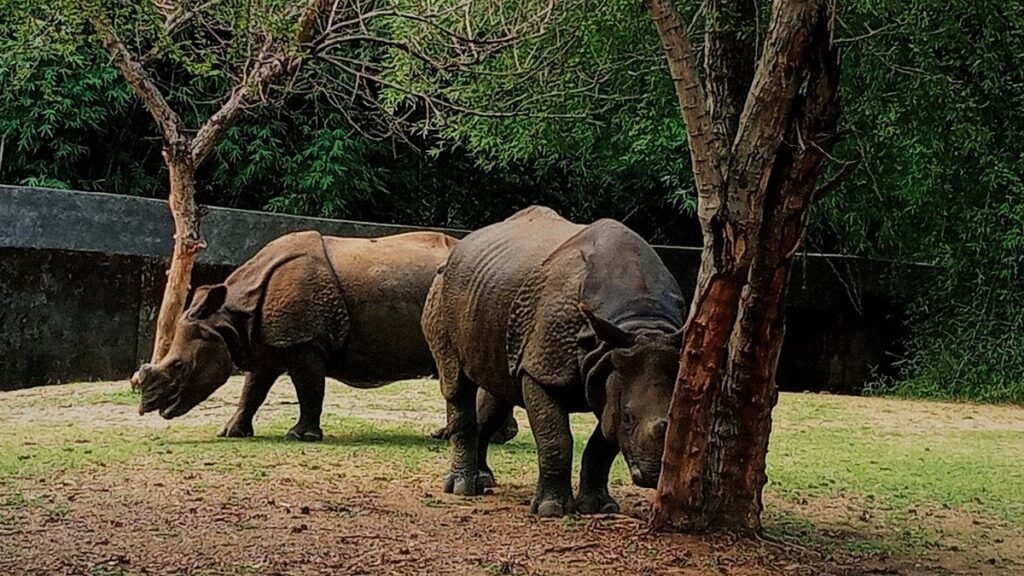
Modern Landmarks
Chennai boasts several modern landmarks that showcase the city’s progress and development in recent years. These landmarks are not only architectural marvels but also important centers for commerce, entertainment, and culture. Here are some of the notable modern landmarks in Chennai:
1. Chennai Metro Rail: The Chennai Metro Rail is a modern and efficient rapid transit system that has transformed public transportation in the city. It connects various key areas and has significantly reduced travel time and congestion on the roads.
2. Anna Centenary Library: The Anna Centenary Library is one of the largest libraries in Asia and a modern architectural wonder in Chennai. It houses an extensive collection of books, magazines, and digital resources, making it a valuable knowledge hub for students and researchers.
3. Tidel Park: Tidel Park is a state-of-the-art IT park that has played a pivotal role in establishing Chennai as a prominent IT and software services destination in India. The park houses several IT companies and has contributed to the city’s economic growth.

4. Kalakshetra Foundation: The Kalakshetra Foundation is a cultural institution dedicated to preserving and promoting traditional Indian arts and crafts. The campus includes beautifully designed buildings and a serene ambiance, where students learn classical dance, music, and other art forms.
5. Chennai Trade Center: The Chennai Trade Center is a modern exhibition and convention center that hosts various trade shows, conferences, and events. It has played a significant role in promoting business and trade in the city.
6. Dr. MGR Film City: Named after the iconic actor and politician M.G. Ramachandran, the Dr. MGR Film City is a sprawling film studio complex that serves as the shooting location for numerous Tamil films and television shows.
7. Cholamandal Artists’ Village: The Cholamandal Artists’ Village is one of the largest art communities in India. It is a modern landmark that promotes contemporary art and serves as a platform for emerging artists to showcase their talent.

8. Ramanujan IT City: The Ramanujan IT City, located in the Taramani area, is a major IT and business park that houses several multinational companies. It has become a significant employment hub in Chennai’s IT sector.
9. M.A. Chidambaram Stadium (Chepauk Stadium): The M.A. Chidambaram Stadium, also known as Chepauk Stadium, is a modern cricket stadium that has witnessed numerous memorable cricket matches. It is one of the oldest cricket stadiums in India and has a rich cricketing history.
10. Express Avenue Mall: The Express Avenue Mall is a modern shopping and entertainment destination in Chennai. It features a wide range of retail stores, restaurants, and a multiplex cinema, making it a popular spot for shopping and leisure activities.
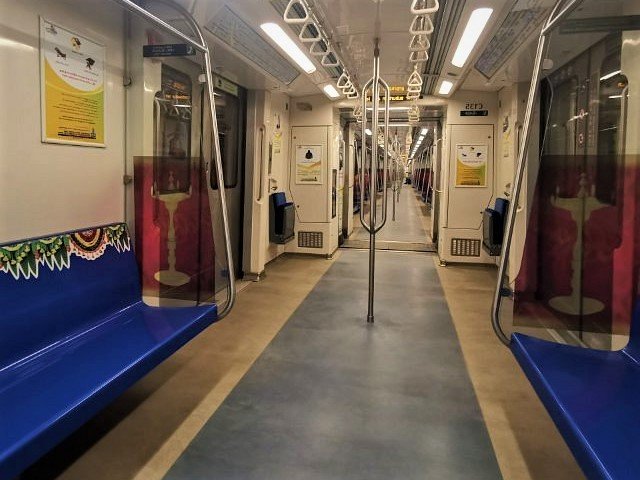
These modern landmarks in Chennai represent the city’s growth and progress in various domains, from infrastructure and commerce to culture and entertainment. They contribute to Chennai’s identity as a dynamic and vibrant metropolis that embraces modernity while preserving its cultural heritage.
Chennai, with its rich history, vibrant culture, and modern outlook, stands as a city that has embraced the winds of change while cherishing its deep-rooted traditions. A place of warmth, diversity, and innovation, Chennai continues to charm visitors from all over the world, making it an unforgettable destination that showcases the best of India’s heritage and progress.
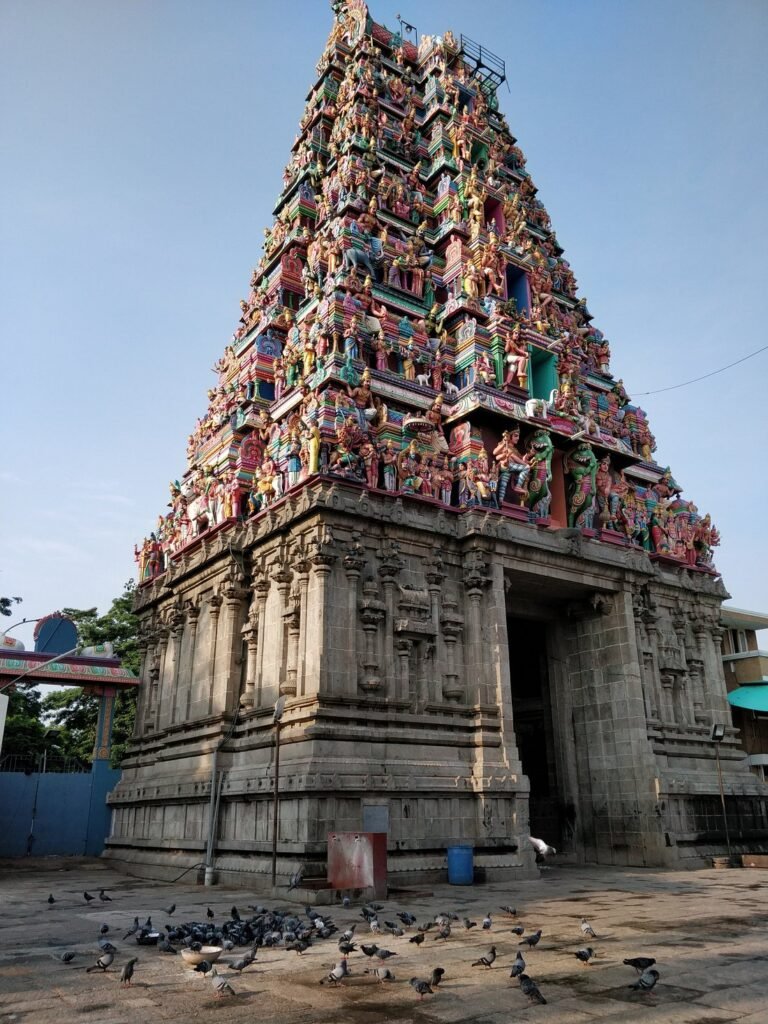
Check out the other blogs.
